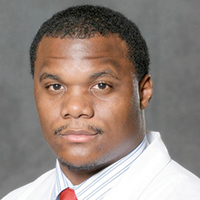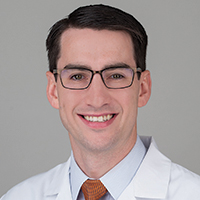Oct 20, 2017
By Brandon J. Blue, MD, and Michael Devitt, MD
During residency and fellowship, trainees are thrown in a world of call schedules, medical rounds, and patient care. While battling these new stages in life, many decide to start a family.
In the November 2016 issue of ASCO Connection, Margaret E. Gatti-Mays, MD, MPH, and Jennifer J. Gao, MD, shared their experiences of becoming mothers in the article “Dr. Mom: Perspectives on Starting Your Family During Medical Training”.
In this article, we write from the perspective of fathers starting families during fellowship, and offer our advice for dads who are working to balance their career and family responsibilities.
Dr. Blue’s Experience
I started my journey into fatherhood during my internal medicine residency with the birth of my son. During this time, I found balancing my commitments at home and work rather difficult. I was given a 2-week paternity leave; however, I quickly learned that my commitments at home would need to be more extensive. My situation may be more complicated than that of most residents who become new parents, given that my wife was also in medical residency at the time of our son’s birth.
I encountered unique joys, such as leaving a long MICU call to go to the daycare my son attended to eat lunch with him, sharing pictures and stories of fatherhood and family with my friends and coworkers instead of work- related problems, and spending my days off at parks and toy stores. These joys were also countered by some distinct challenges, including stains of various kinds tainting the cleanliness of my white coat, having to take time off to care for sick children, and not attending residency-related after-work outings due to parental duties.
related problems, and spending my days off at parks and toy stores. These joys were also countered by some distinct challenges, including stains of various kinds tainting the cleanliness of my white coat, having to take time off to care for sick children, and not attending residency-related after-work outings due to parental duties.
While tough, my time in residency as a father was amazing and made me a better physician. I found that I became more patient, more caring, and developed a better ability to empathize with my patients. Currently, I am a third-year hematology/oncology fellow, and my wife and I recently welcomed our second child, a daughter, into the world.
Juggling oncology fellowship, research deadlines, and my kids’ playdates and swim lessons made me more efficient as a physician. I know my time is a precious commodity, and I cannot afford to duplicate work. Finding time to study for boards while also attending parent/teacher conferences has become my new normal. I found that my ability to balance the work/life experience improved when my children were born. Oncology is a difficult field where you deliver news daily that affects the lives of families forever; however, being able to come home to my children singing (and often crying) makes the emotional challenges of our field a little lighter. In fatherhood, there is an added richness to my life and career, and the stories of fathers’ experiences during medical training should be better known.
Motherhood during training is becoming more widely discussed, and I am glad to see that more provisions are now made to accommodate and benefit women trainees in the form of maternity leave. However, not as many strides have been made for fathers during their training, and robust paternity leave policies are still rare in the United States. Please know that fathers often want to be more involved in parenting, but we too need the support of our fellow trainees, administrators, institutions, and families in order to achieve the balance we seek between our work and family lives.
Dr. Devitt’s Experience
Becoming a father was a transformative and wonderful time in my life. It also represented one of the biggest challenges that I have faced as a trainee. My daughter was born on April 2, 2015, at the end of my year as a chief resident at the University of Virginia. As a chief resident, I had a lot of flexibility to meet the demands of fatherhood and spend time with my wife and daughter. When our daughter was 3 months old, I started my fellowship in hematology and oncology at the University of Virginia, and the flexibility in my daily schedule diminished significantly.
As is the case for many fellows, my first year was spent fulfilling many of the clinical requirements of my program. Covering the inpatient and consult services, with the demands of critically ill patients, required that I spend many late nights and early mornings in the hospital. Being at home was not always a reprieve from the demands of patient care, as I took home call frequently
during my first year of training. Of course, the demands of learning how to care for patients in the context of the rapidly changing field of hematology and oncology were also a priority. However, the challenges I experienced in my fellowship were met with tremendous rewards. Teaching residents about the appropriate workup for a suspected cancer, helping a patient to understand the disease they are battling, and connecting with patients and colleagues during this challenging time made the effort worth it.
Mirroring the challenges and rewards of the first year of fellowship was my first year of fatherhood. Soiled diapers, dirty bottles, and my daughter’s increasingly curious mind demanded a lot of attention and time. Nighttime was equally as difficult, with my daughter waking frequently to eat, for more diaper changes, and—not infrequently—suffering from numerous viral illnesses, courtesy of daycare. However, as with fellowship, the rewards of fatherhood were even greater. The love shared between my daughter and me as we snuggled when she felt poorly, as we splashed around at bath time, and as we read many books together was immeasurable. As she has gotten older, the challenges have changed, but the love continues to grow.
I am thankful for the experiences I have had and the father and doctor that I have become. Hopefully, the lessons I have learned will serve me well over the final year of my fellowship. Along with the trials of finding and embarking upon my first job following the completion of my training, I will face a new set of challenges with the arrival of twin daughters in a few more months.
Our advice to current fathers in medical training or fathers-to-be
Your time is precious; make sure you account for it. Managing your time effectively is probably the most important thing you can do as a father and trainee. Whether it is the old standby of paper and pen or electronic alternatives, find a system that works for you, and stick to it. Find a way to share your calendar with your partner, and talk about your upcoming obligations. An open line of communication is important so that your partner understands the competing demands on your time, and you are able to plan as a team.
Set priorities that are important to you and your family. With all the competing demands for your time, there will inevitably be conflicts. Think about what things are the most important to you and your family. Again, this means keeping an open line of communication between you and your partner. While you will want to spend as much time as possible with your children, you also need to ensure success in your own career. Knowing your priorities ahead of time can help you decide what obligations take precedence and when you need to say no.
Understand your program’s parental leave policy. Every program is different in terms of its policies on parental leave. Understand what your program allows, and don’t be afraid to advocate for more generous leave if that is important to you. Like many Accreditation Council for Graduate Medical Education requirements, the policy on parental leave is open to interpretation. Talk with your program leadership if you feel that your program’s parental leave policy is too restrictive.

